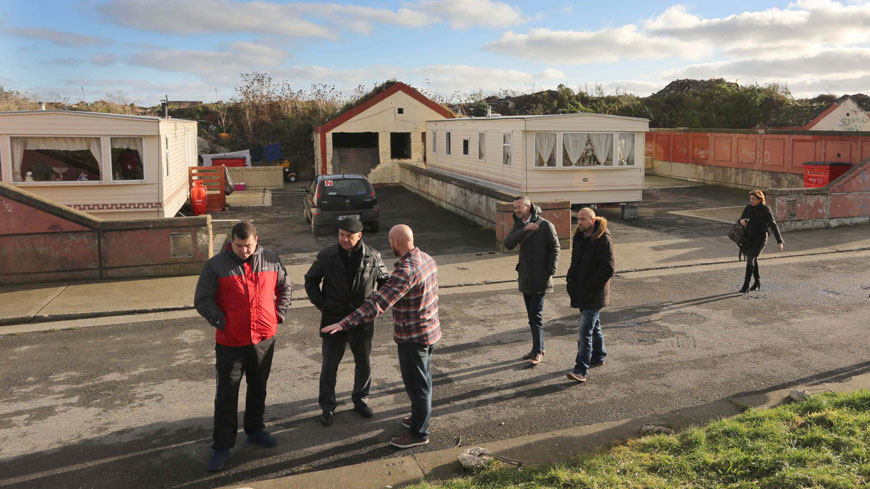“The Irish government should ensure that the economic upturn benefits the most vulnerable groups and should promote equality of Travellers, women and children by removing the barriers that disproportionately hinder them from fully enjoying their rights”, said the Council of Europe Commissioner for Human Rights, Nils Muižnieks, in a report released today based on a visit to the country carried out in November 2016.
The Commissioner welcomes the government’s recent recognition of Travellers’ ethnicity. However, he remains concerned by the very negative impact of a reduction in the State’s support for the Traveller community following the economic crisis in 2008. “The Irish authorities, including at local level, should reinvest in the community and improve access of Travellers and Roma to education, health, housing and employment, as well as to legal remedies in cases of discrimination. They should also provide adequate safeguards against forced evictions”.
The Commissioner calls on the Irish authorities to tackle persistent gender inequalities, including through a review of the constitutional provisions that perpetuate negative stereotypes against women and through long-term measures aimed at overcoming gender bias in the media and education system. Sufficient funds should also be allocated to policy initiatives that could facilitate gender mainstreaming, such as the Public Sector Duty, which requires all public bodies to eliminate discrimination and promote equality. “The Irish government should make significant efforts to bridge gender inequalities, fuelled by entrenched stereotypes and compounded by the impact of austerity measures, which prevent women from fully participating in the political and economic realms”, said the Commissioner.
Furthermore, the Commissioner encourages the Irish authorities to improve the legislation and overall response to domestic violence, including by improving access to emergency safety orders and accommodation for women victims of violence. He also recommends that Ireland ratifies the Council of Europe Convention on Preventing and Combating Violence against Women and Domestic Violence as soon as possible as it “provides a framework and methodology to change social norms and practices that reproduce gender-based violence”.
Additionally, the Commissioner strongly urges the Irish authorities to adopt legislation to remove all impediments to women’s access to safe and legal abortion. In particular, given the crucial role the Eighth Amendment of the Irish Constitution - protecting the right to life of the unborn on an equal basis with the right to life of the pregnant woman – plays in preventing a comprehensive reform of the legal regime governing the termination of pregnancy in Ireland, he strongly hopes that it will be removed soon. “Decriminalising abortion within reasonable gestational limits is essential to women’s equality. At the very minimum, abortion performed to preserve the physical and mental health of women, or in cases of fatal foetal abnormality, rape or incest should be made lawful”. The Commissioner further urges the authorities to ensure that mandatory, comprehensive and non-judgemental sexuality education is taught in all schools in Ireland in order to protect the sexual and reproductive rights of all, including women.
In a context of growing child poverty, including a significant rise in child homelessness, the Commissioner urges the Irish authorities to reverse the negative impact of austerity measures on children’s access to social protection, education and health. The Commissioner also draws the attention of the authorities to the need to address shortcomings in the protection of the rights of immigrant children flowing from the system of Direct Provision accommodation for asylum seekers and from the lack of avenues allowing undocumented children to secure a legal status.
Stressing the need to promote an inclusive education in a context where the vast majority of state-funded schools are denominational, the Commissioner calls on the Irish authorities to remove the exemption allowing state-funded schools to use a child’s religion as admission criteria and to ensure options for students to opt-out from religious classes. “The system of preferential admission under which denominational schools – constituting 96% of primary schools in Ireland - may give preference or refuse students on the basis of their religion is incompatible with the principle of non-discrimination and works against the need to foster an inclusive education”, said the Commissioner.
Noting that the State has taken a number of measures to address past human rights abuses against women and children in institutions, including women’s homes, schools and healthcare institutions, the Commissioner calls on the Irish authorities to ensure full respect of the applicable international human rights standards when dealing with all such abuses. Devoting specific attention to the past abuses that occurred in the context of the Magdalene Laundries, the Mother and Baby Homes, medical procedures for childbirth in maternities, and sexual abuses in national schools, the Commissioner recalls that all groups of victims of past serious human rights abuse have a right to truth, full support and effective remedies, as well as prompt, independent and thorough investigations into allegations of abuses capable of ensuring accountability.



